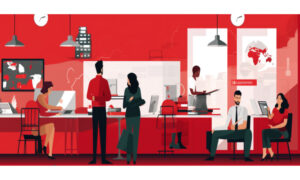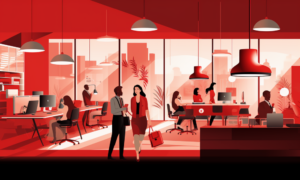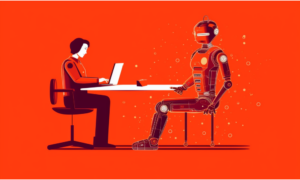Why the future of work is human-centric
- 6 Min Read
Sharon Bachar, head of people, international, WeWork, delves into the importance of flexibility, health and safety, and user-centric design solutions.
- Author: Sharon Bachar
- Date published: Mar 8, 2021
- Categories

The impact of the pandemic on our lives has been universal. It has created seismic waves in the world of work, providing an opportunity for companies to pause, reset and revaluate their working policies and business assets in this new era of uncertainty. Likewise, employees – who have been exposed to greater flexibility and autonomy – are also giving more thought to how, where and when they want to work. They are paying more attention to the benefits that employers offer, prioritising their wellbeing and safety more than ever before.
With the promising progress on COVID-19 vaccinations, the novelty of working from home long gone, and the increasing demand for flexible and safe workplaces, businesses must now explore ways to adopt a hybrid and human-centric approach. Health and safety must be at the forefront to ensure long-term employee satisfaction, strengthen business performance and remain a competitor in the ongoing war to attract and retain top talent.
Here are four tips to help businesses engage their workforce and embrace a new style of working that places the employee at the core in the future of work.
Flexibility is the future
The past year has taught us many things; most notably, that although working from home can be done and many have enjoyed this opportunity to spend more time with loved ones, balance domestic jobs and spend less time commuting, it is not a long-term or sustainable solution for everyone. Remote work has proven to, at times, stifle productivity, collaboration, innovation and wellbeing. In a recent survey in partnership with Brightspot, we found that the vast majority (90 per cent) of people want to return to the office at least one day a week. Employees miss regularly reconnecting with colleagues and often feel unproductive and isolated at home.
The value of the office, therefore, remains intact but as a repurposed space away from home to collaborate with colleagues, and accommodate different working styles and tasks that can’t always be done at home. With this in mind, and especially with the newfound trust established between employer and employee over the past year, companies should look to explore new avenues of flexible working. For example, adopting satellite offices across a city or country would allow your employees to work wherever is most convenient and suitable for them and reduce travel times in the process. For this very reason, at WeWork, we have been able to enhance our flexible offering and leverage our scale by launching ‘All Access’ – a new membership product which gives our members access to any one of our 800+ locations globally.
Health and safety takes centre stage
Flexible working arrangements must support and amplify the tasks that can’t happen remotely, and employee safety – which has become even more critical since the start of the pandemic – is intrinsically linked to this. Enhancing cleaning measures and modifying space to adhere to new social distancing requirements and local government guidance is paramount. Companies should make these changes according to how their spaces are used; for example, high-traffic areas and meeting rooms should be altered to create a socially distanced layout and new occupancy level.
What is also absolutely crucial is that when employees go into the office, they feel reassured; this can be achieved through increased communication by using behavioural signage to direct employees around the office safely and to enforce face-covering policies where applicable. Complimentary sanitisation products should also be dotted around each space. At WeWork, we worked with internal experts and external advisers to implement precautions and protocols to instil confidence for both our employees and members. The agility of our business model means we were able to adapt our spaces and introduce these measures quickly and efficiently. Our modifications have been independently audited and verified by Bureau Veritas, a globally recognised audit agency.
User-centric design solutions in the future of work
With the renewed purpose of the office as a space away from home to be collaborative, creative and productive, design must now play an important role in not only striking a balance between focus work and team projects, but inspiring employees as they enter the space. Offices are no longer about having a desk to work from Monday to Friday, and so making your design as flexible as possible allows you to adapt physical space based on what employees want from the office, almost overnight.
At WeWork, due to the nature of our spaces, we have been able to introduce collaboration hubs; taking our existing spaces and designing them to meet different working styles. We also speak to our members and employees to create bespoke solutions balanced around their evolving needs. Speak to your employees on a regular basis to understand their needs and what they would like from their workspace.
Employee sentiment and satisfaction
The pandemic has had a significant impact on mental wellbeing, and working from home full time during lockdowns has left many employees feeling isolated and unmotivated. A recent study showed that returning to the office for four to five days a week (when restrictions allow) led to a 54% increase in morale, compared to those working from home. Now, as we begin to emerge from the pandemic, it is more important than ever to check in with your employees to see how they are and how they would like to work moving forward.
These insights should be the backbone of planning for the future of work. It is also essential that senior leadership not only takes a transparent and honest approach to let employees know about any upcoming policy changes or new working rotas, but also welcomes any feedback or new ideas. Checking in with my team on a regular basis has been critical in understanding how they are feeling. Their varying perspectives have also helped shape and improve some of our initiatives.
Company leaders should also look to create virtual events and employee perks to keep employees engaged and connected, whether they are at home or in the office. At WeWork, we partnered with Unmind, the workplace mental health platform, and have introduced a virtual events programme for members and employees; so far, we have hosted over 900 events online.
The past year has been incredibly tough, but it has also created a unique opportunity to shift to a more agile and human-centric approach in the future of work – something which employees have always wanted and needed. With a new trust between employers and their employees, repurposing the office as a space for collaboration and productivity and injecting greater flexibility into your working policies is key to surviving and thriving in the future of work.









